Behind the wheel of Acura's latest incarnation of the $156K NSX supercar
The sports car is back after an 11-year absence — and it's a hot drive.
— -- Jon Ikeda is the man at Acura most responsible for making the latest incarnation of the NSX supercar a reality, and the fact that he likes the word “fun” should be a big tip-off about how this iconic sports car handles.
Ikeda, Acura’s vice president and general manager, and I are eating dinner together at Bagatelle, a trendy French bistro in New York City’s Meatpacking District. A veteran designer with Honda, Acura’s parent company, he used “fun” at least a dozen times during that dinner to describe his pet project.
“Did you have fun? We want you to have fun,” he asked enthusiastically as he debriefed me on my test drive.
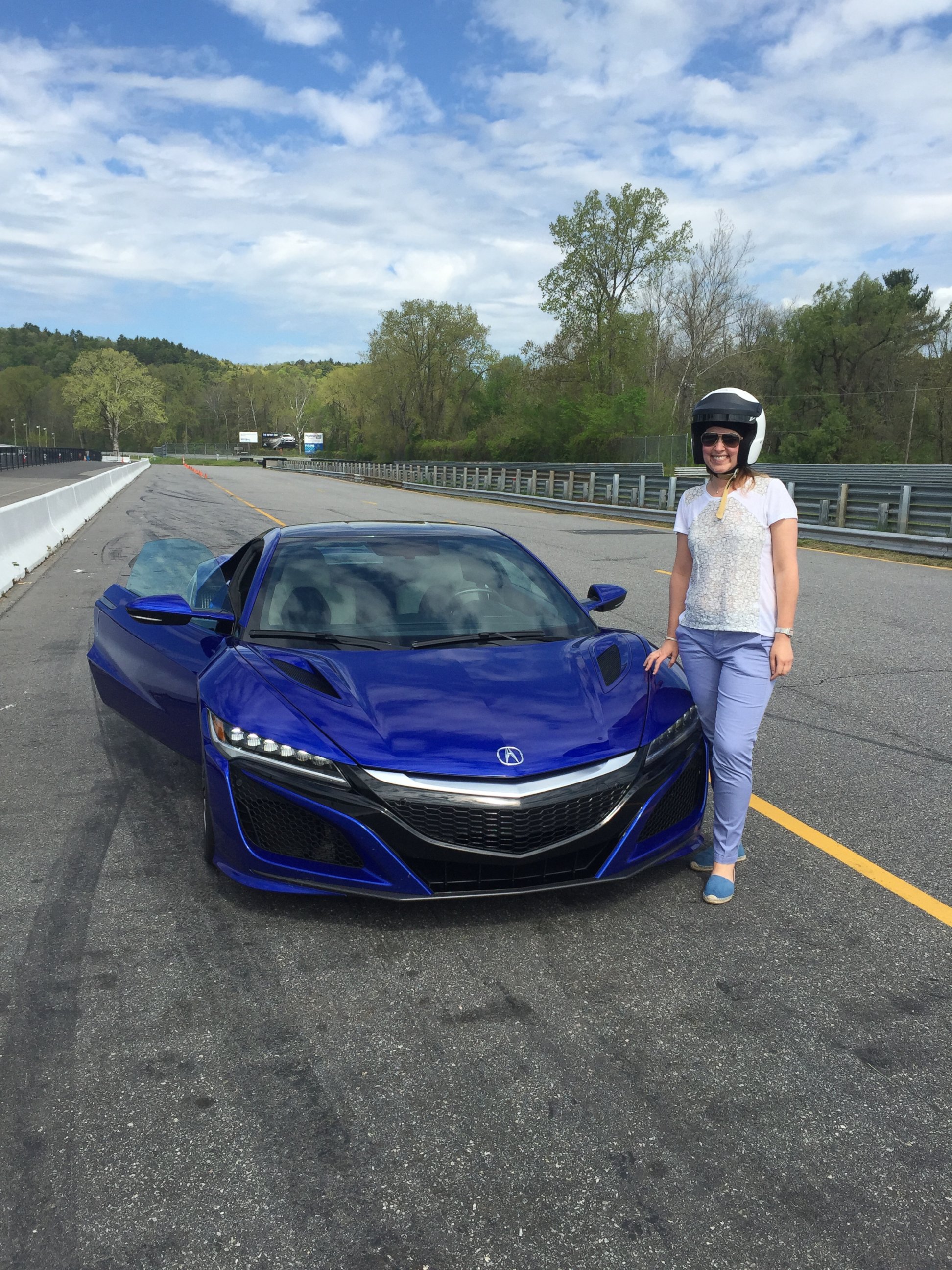
Acura handpicked a small group of journalists to get behind the wheel of the Japanese automaker’s latest generation of the NSX — a sports car that became a benchmark for the brand and developed a rabid fan base when it was released in 1991. Its popularity and stamp of approval by auto editors quickly propelled it to the higher echelons of the automotive world, earning it a spot next to the European exotics that oozed power, luxury and exclusivity. Acura has certainly amped up its efforts to make sure the 2017 all-wheel drive, nine-speed automatic hybrid NSX rejoins the supercar conversation and attracts the attention of those was can afford the $156,000 sports car. (With options, the car tops out at $206,000.)
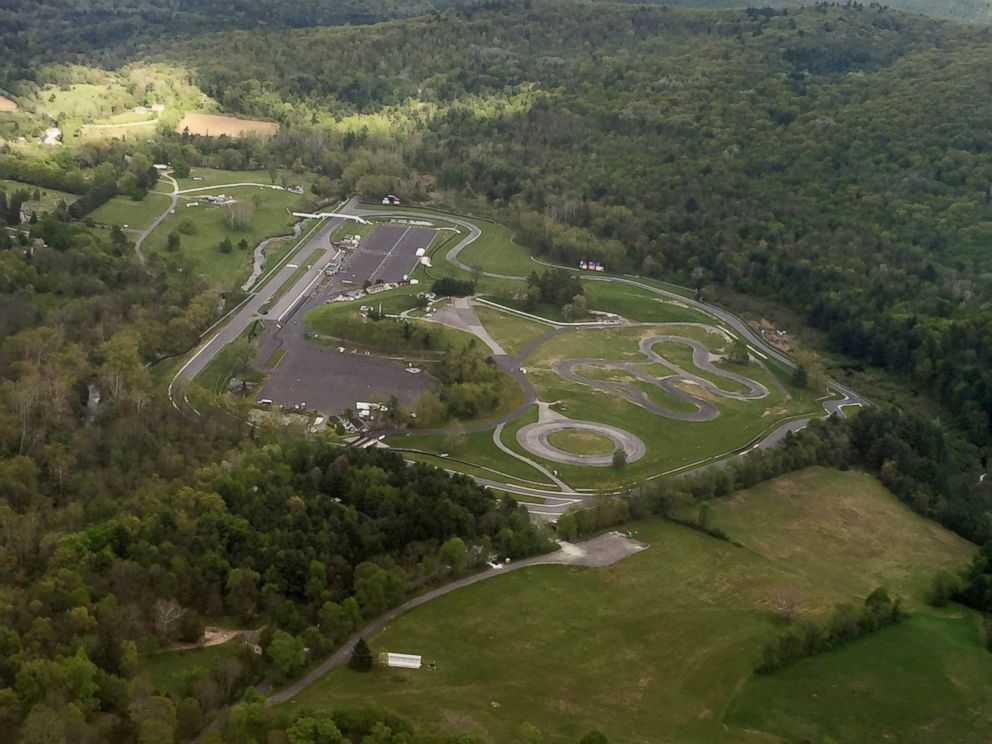
A racing neophyte, I wanted to prepare myself mentally for the test-driving experience by speaking to someone who is one of the most passionate and widely known car collectors in the world. I called up Jay Leno (yes, that Jay Leno) at his office in California. He took the NSX for a spin earlier this year on his show “Jay Leno’s Garage.”
Leno said the NSX was not an “aggressive” drive yet he was quite “pleased” with it. He prefers a rear-wheel drive to an all-wheel drive and missed the manual gear option. He reminded me that when the NSX was introduced to American drivers a quarter of a century ago, it was a reasonable success, though widely considered “a very expensive Honda.” It was a beautifully engineered piece of machinery, he said, but would a car enthusiast be willing to pay a Ferrari price for a Honda? That said, he credited Acura for designing a “good-looking car” in the latest iteration of the NSX and deemed it a “value for the money” next to the competition.
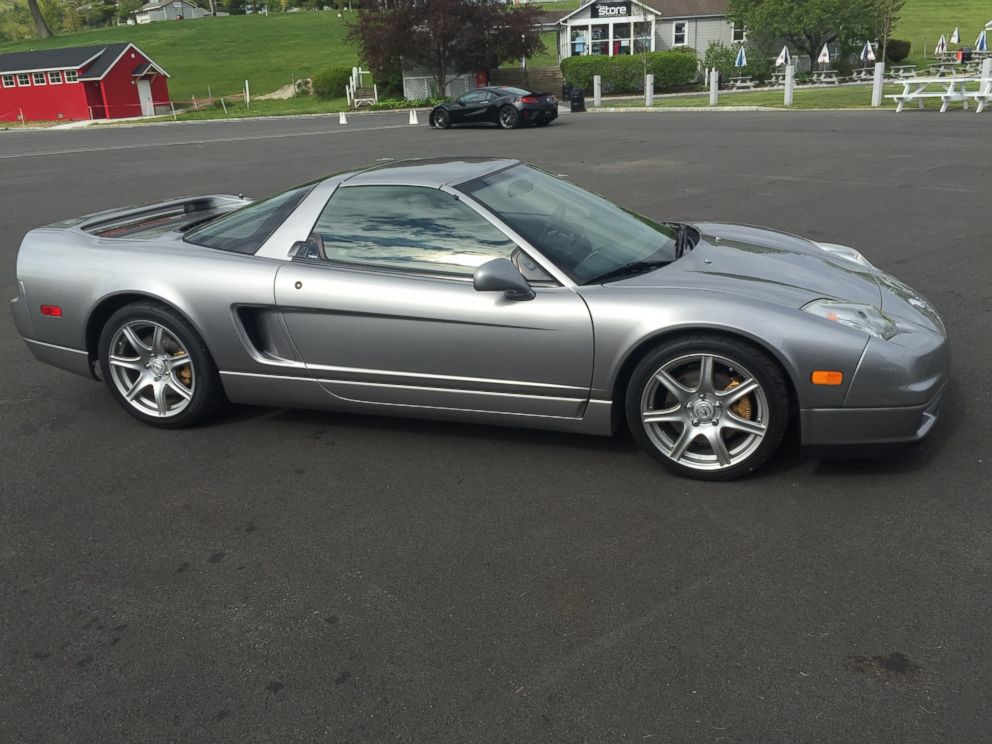
“I liked what I saw,” Leno affirmed. “The NSX is a fascinating story.”
I wholeheartedly agree that the NSX is fun to drive. I may have been the slowest and most conservative driver at the historic Lime Rock Park racetrack in Connecticut — even the other journalists zoomed past my vehicle (the smell of scorched rubber was overpowering at times) — but it became immediately obvious the NSX was designed for performance. Its 3.5-liter twin-turbo V6 engine with 573 horsepower and 476 pound-feet of torque will impress those who are accustomed to driving an Audi R8 or Porsche 911 Turbo, maybe even a Ferrari 458.
When I stomped on the gas, the NSX proved its racing car specs, thrusting me back into the seat from the intense acceleration.
What I liked most about the NSX was its proficiency and dexterity off the track. For over an hour, the NSX and I traversed the bucolic Connecticut countryside, whipping past horses, sheep, cows and locals in their pickup trucks. I even caught one fellow driver braking to get a better look at my red NSX (his tongue hanging out of his mouth like a thirsty dog) as my driving partner, Roman Mica, and I pulled over to review the assigned driving route. Did I mention that Acura neglected, for some reason, to install GPS navigation as part of the base model?
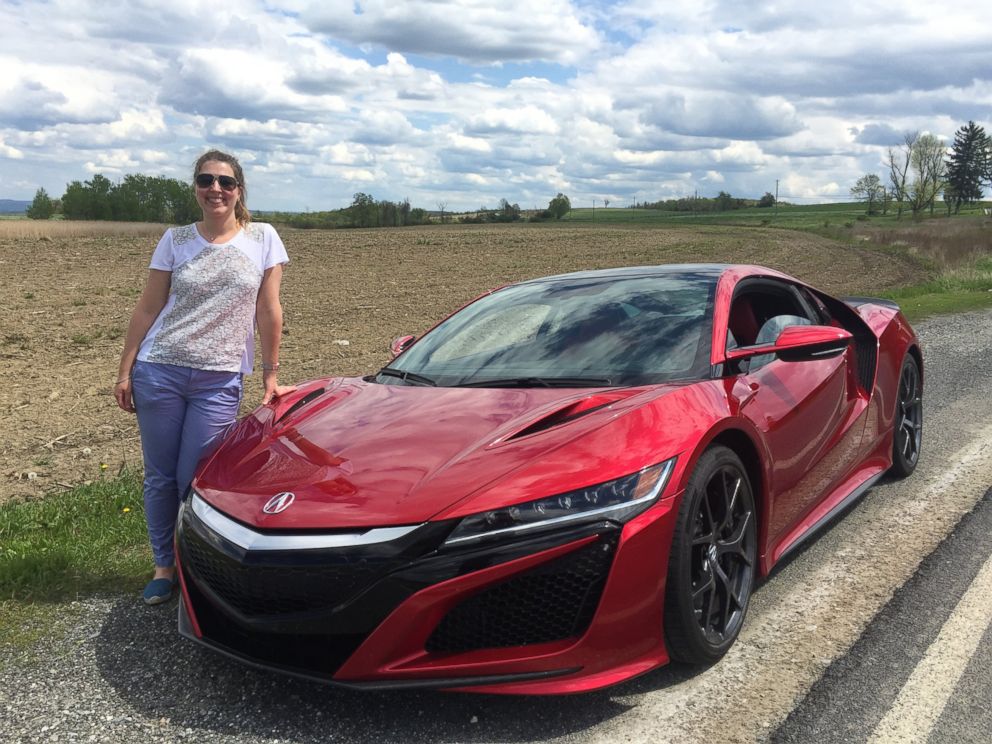
Mica and I were able to navigate northwestern Connecticut’s hilly and curvy roads with little trouble, searching for checkpoints on the basis of miles driven, but how could such an expensive sports car not come equipped with such a basic amenity?
“More and more consumers are using their phones for navigation,” Ikeda told me later when I brought up my GPS concern, and the technology in the NSX can be found in supercars double the price, he assured me. “It’s all relative,” he shrugged.
True, an NSX driver can plug in his or her iPhone as part of the Apple CarPlay function, allowing access to the driver’s iPhone screen and apps, but I was still caught off guard by the response. (For $2,800, a driver can purchase GPS as part of the ELS Studio Audio Tech package, the upgrade from the standard premium audio system).
GPS was not the only amenity that was notably missing from the vehicle: Acura omitted vanity mirrors on the driver’s and passenger’s visors. (You can’t always depend on your smartphone as a mirror.) For the 99 percent of drivers who are accustomed to changing gears by physically moving a gearshift, that task has been simplified to pressing a button. (How quotidian.)
Moreover, what I craved most in the NSX was greater visibility and natural light. I could see the rolling hills and church steeples clearly when staring forward on the road, but I found operating in daily traffic challenging. I had to either swivel my neck a good 90 degrees to see oncoming cars at an intersection or depend on my driving partner to give me the green light to make a turn. (Visibility and perception are vital roles in keeping a driver safe on the racetrack too). For this reason, I would think twice before heading out to my nearby Whole Foods or maneuvering past speeding cars on the New Jersey Parkway in the NSX without a second pair of eyes to guide me. The NSX may be built for speed and power, but Acura also wants it to be a part of one’s everyday routine, as its predecessor was.
“There’s nothing about this car that’s intimidating,” Ikeda declared. “It’s flexible. It’s more than just for show. It adapts to what your needs are.”
The NSX may not necessarily meet my day-to-day driving demands, but then again, I am not the target audience. With a price tag that exceeds that of an Aston Martin V8 Vantage or a Maserati Quattroporte, only a sliver of the driving population will be able to own this car.
And that’s completely true for the foreseeable future: Acura plans to produce just 800 NSX cars per year in North America. The automaker began taking deposits at the end of February, and the company has received enough orders to keep its production staff in Marysville, Ohio, busy for the next two years, an Acura spokesman told me. Deliveries start this week, and spotting one on the road may be a rarity.
“It is an expensive purchase, but it’s unique. It will stick out among the Ferraris,” Ikeda told me. “It’s for a different type of person.”
He hopes to ramp up production of the NSX soon — once the company figures out how many it can make per day.
“We want to do more, and 800 is conservative,” Ikeda acknowledged. “The goal is to produce eight to 10 a day.”
The NSX will be entirely assembled by hand at its Ohio manufacturing facility, and Acura has crowed that it’s “the only supercar designed, developed and manufactured in the U.S.”
Ikeda said Acura’s commitment to the success of this vehicle was unequivocal; the automaker built its performance manufacturing center and engine plant especially for the NSX because “there was no factory in Japan or North America that could do this.” (Acura declined to reveal how much it cost to build the plant).
“We want to raise the bar with this car,” he said. “NSX was known for its innovation, and it’s still innovative.”
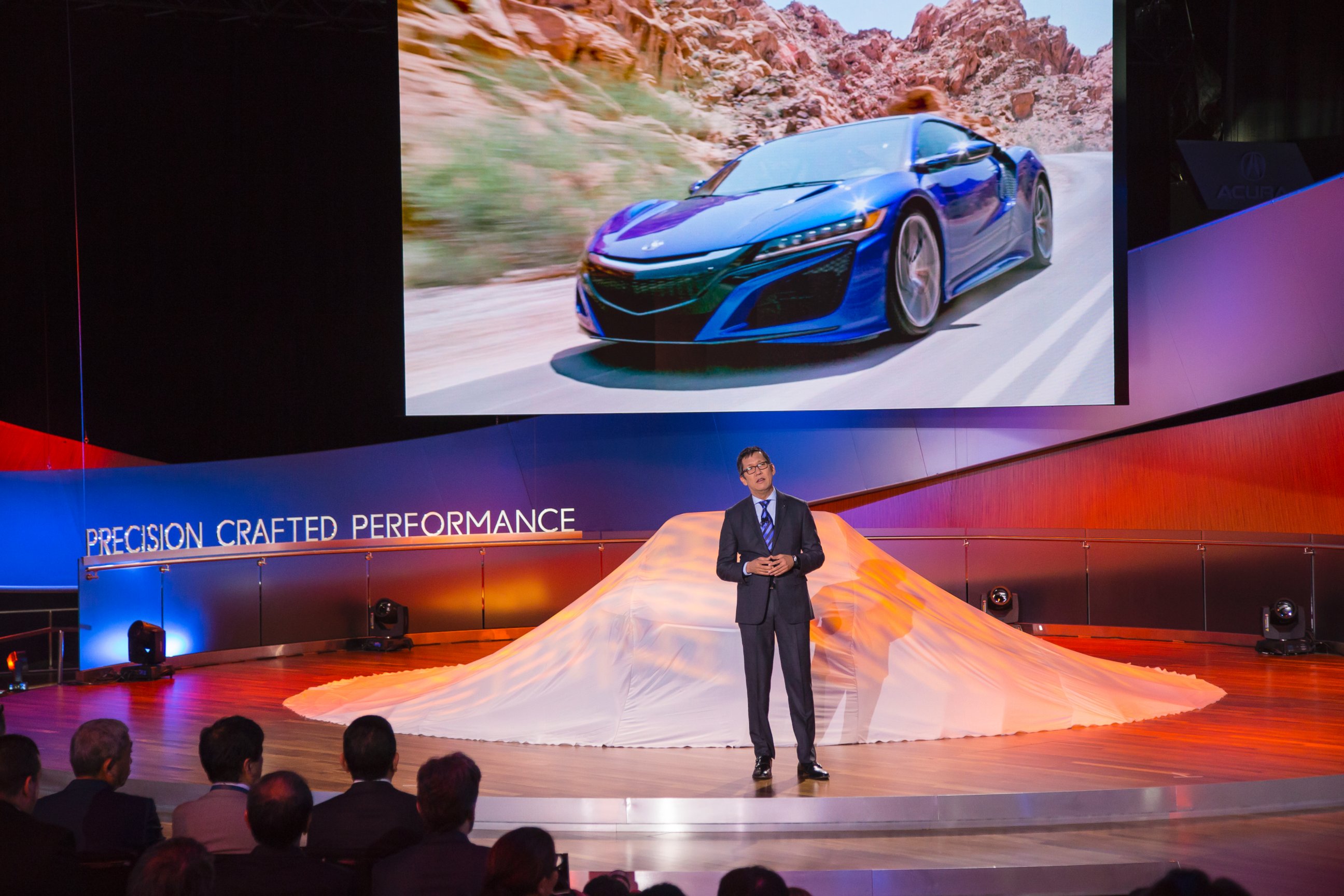
Interested buyers will have to depend on reviews and word of mouth to get a better handle on the car’s capabilities. There are no plans to keep an NSX in Acura dealerships. As of now, potential customers are directed to customize their NSX on the Acura website.
An Acura spokesman, however, told me he believes some of the orders the company received for the sports car may be from dealers who want a model on their showroom floor. Acura understands that much of its customer base cannot afford an NSX, so the carmaker is depending on the NSX for a halo effect: A driver goes to a dealership to learn more about the NSX and ends up signing paperwork for an Acura MDX crossover or RLX sedan.
The NSX will surely draw stares and second looks at the racetrack and around town. It's stunning, sexy and confident — the same qualities an NSX enthusiast will feel when driving this supercar.




